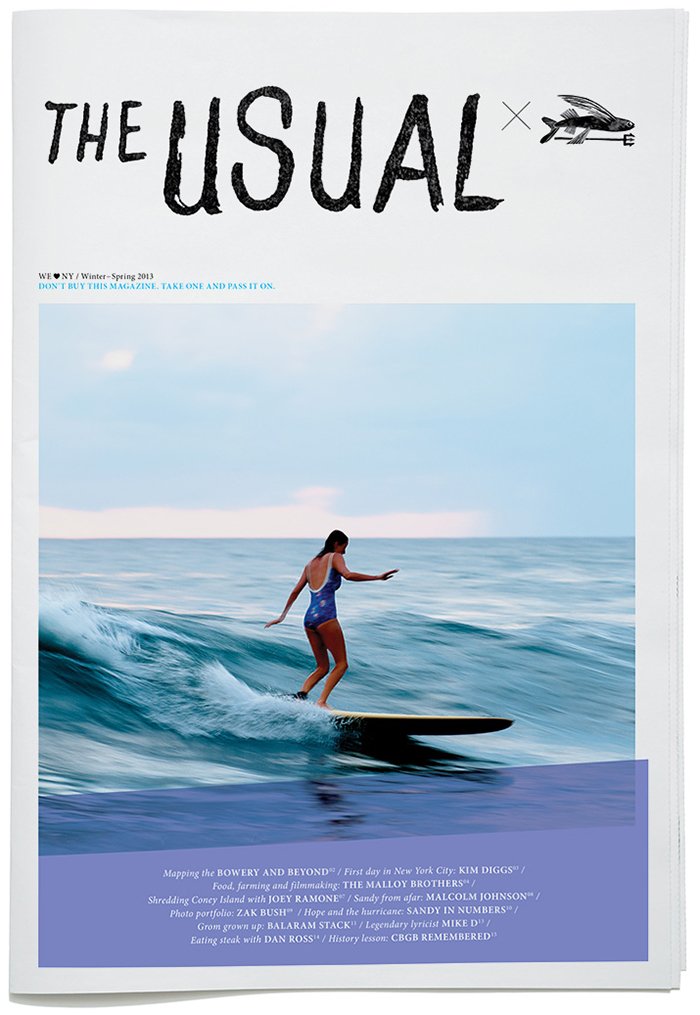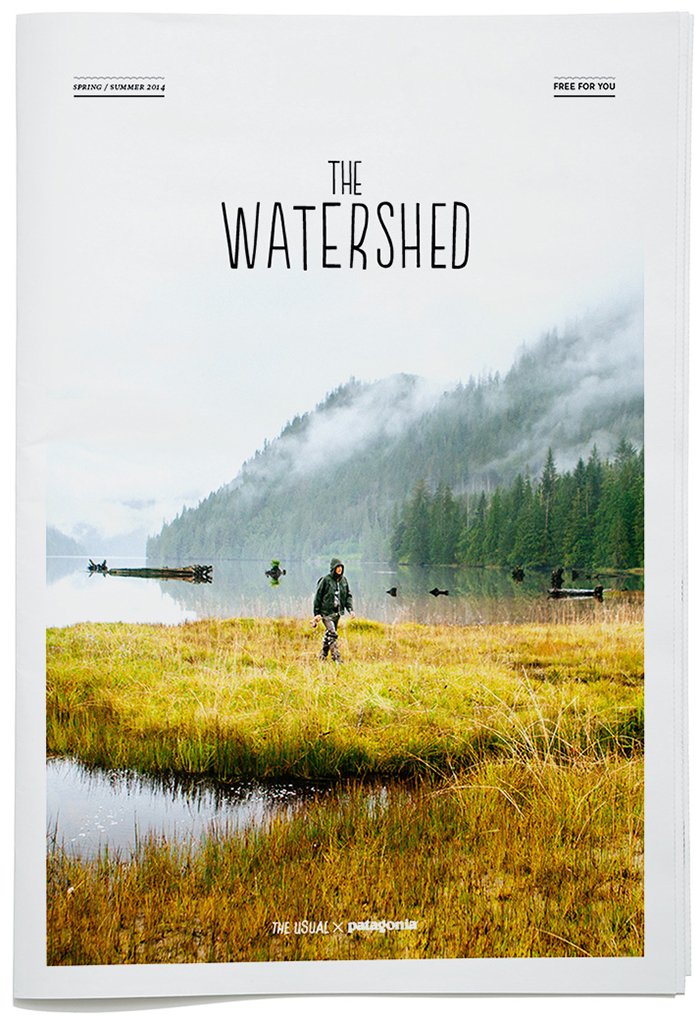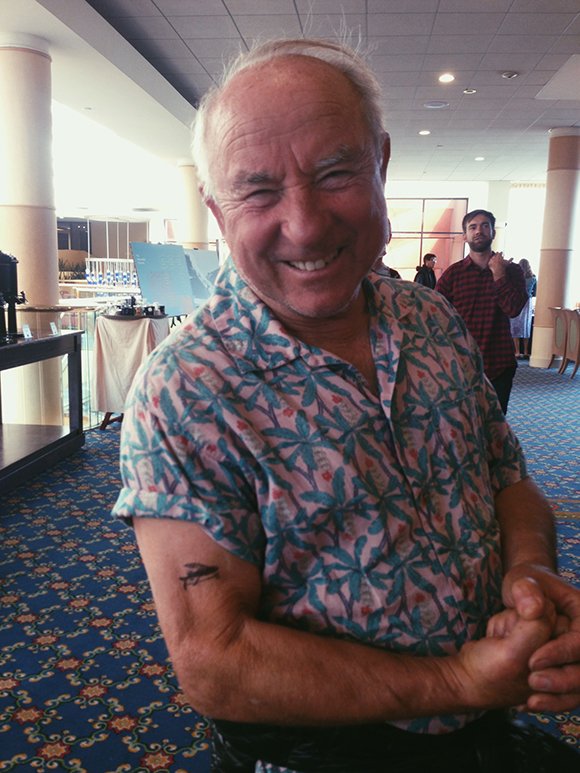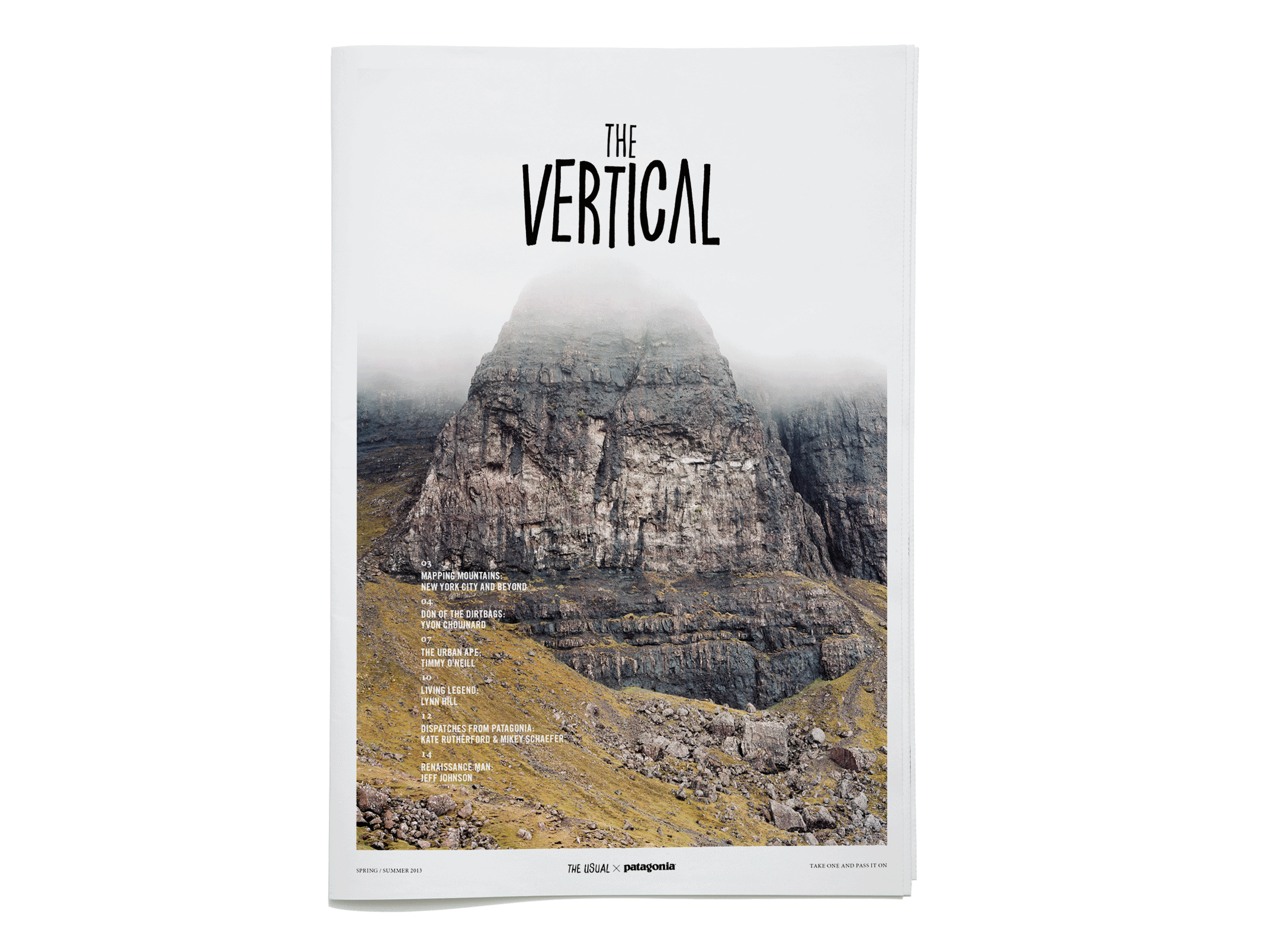Newsprint Magazine for Patagonia stores and mailers all over the world.
Client: Patagonia
Agency: The Usual Creative
Roles: Creative Director, Illustrator
Patagonia saw ‘The Usual’ and commissioned my partner Yasha Wallin and I to start ‘The Usual Creative’ and make a newsprint magazine series for them, in our unique irreverent style. Each issue focused on a different area of the brand — (The Usual X Patagonia) surfing, (The Drift) snowsports, (The Vertical) climbing, and (The Watershed) the environment.
I cannot overstate how much it meant to us to be trusted by Patagonia to make their content. Highlights include interviewing surf legend Gerry Lopez, meeting and speaking with the brand's founder Yvon Chouinard who gave us his six rules to live by, collaborating with all of Patagonia's ambassadors, illustrating products, and of course, the discounted wetsuits.
Yvon sporting the watercolor Patagonia tattoo that I designed
The Usual x Patagonia presents: The Vertical
The Usual x Patagonia presents: The Drift
Yasha Wallin (co-founder of The Usual) and I interviewed Yvon for The Vertical, a special publication with Patagonia
Yvon Chouinard has been wearing the same flannel shirt for 20 years. The 74-year-old conservationist, out-of-the-box thinker, athlete, and craftsman is also a business leader who is always pushing Patagonia, the company he founded, to find solutions to the global environmental crisis. We asked Chouinard what he thinks his legacy will be—turns out he "couldn't really care less." But we speculate it will be measured not by what he encourages (be in nature, be personally responsible, simplify) but by what he discourages (buying, spending, polluting). In short, Chouinard wants us to stop being consumers and start being thoughtful global citizens. Below are the six life lessons we learned from the avid explorer.
1. Optimism is a waste of time
I’m not optimistic at all. I’m a total pessimist. I’ve been around long enough, traveled around enough, and been around a lot of smart people to know that we’re losing. In every single category, we’re losing. In the [United] States, I think saving the planet was number 19 on peoples’ priorities, and now I hear its number four again. Number one is personal security. We have a nation of… scary people. Look at all these conservatives that want to arm the whole country. They want to be able to walk in restaurants with their guns and that’s because they’re cowards.
Every empire collapses. The American empire is probably on its way to collapse now. Nature doesn’t like empires. It doesn’t like accumulation in one place, it doesn’t like monoculture. It’s always trying to make diverse species. It wants to spread everything out. And we’re constantly trying to hold everything in.
I think what's important is to raise a grandchild so they have a life with nature. You protect what you love. And if you love nature, then you'll want to protect it. And that's one of the problems that we have, this nature deficit disorder. We have gang kids in New York City that are afraid to go to Central Park because of the squirrels there. They're so divorced from nature. So the best thing I can do is make sure she has a life as much in the outdoors as possible.
2. Keep it simple
One of the things I really believed in is the idea of simplicity, that life should always be moving towards more simplicity rather than more complexity. And when I see somebody, you know, riding a finless surfboard and surfing better than 99 percent of the surfers out there, I think, “This is fantastic. This is the way to go.” We've gone from tow-in surfing to now paddling into those same waves. And that's the direction we should be going, rather than more toward technology. In the '70s there was a thing around that “he who dies with the most toys wins.” That's wrong—it's the opposite. You want to replace all that gear with knowledge and experience. And so in sports I'd love to see the people who are simplifying their sport. I've done like six routes on El Capitan and Yosemite—and some of those routes that took us 10 days to climb are now being soloed with no rope by guys in their gym shorts. And they're back down before lunch. I think that's absolutely fantastic. Glad they're not my kids, but that's the direction we should always go.
Interview with Patagonia Founder Yvon Chouinard
3. Climb every mountain
There are climbs I've never attempted that I wish I had done, particularly in the Alps. I used to climb in the Alps a lot. You know, like the north face of the Eiger? I wish I had done that climb. To me it's kind of personified everything that I really like about climbing. I have regrets about that, but as far as the failure, I don't look back very much.
4. Cheaters never prosper
We all want to cheat. In climbing, there are so many ways to cheat. You can do a route that's been done 50 times and all you've got to do is follow the chalk marks that tell you exactly where to put your hands and feet. I can't stand to do a route like that because I can't stand to have people tell me what to do. I want to figure it out myself. I look at people climbing Everest—there's a guy back in Austria that gives them a weather report every day that basically tells them to go or not go. It's hundreds of ladders in place, thousands of feet of fixed ropes, Sherpas in front pulling and another one behind pushing. In surfing, there are very few ways to cheat. Tow-in surfing was one way to cheat, but that's passé now. So I think it's the purest sport there is, and the most difficult too. I don't know of any other sport that's more difficult than surfing.
5. Consumerism is killing us
The reason why we won’t face up to our problems with the environment is that we are the problem. It’s not the corporations out there, it’s not the governments—it’s us. We’re the ones telling the corporations to make more stuff, and make it as cheap and as disposable as possible. We’re not citizens anymore. We’re consumers. That’s what we’re called. It’s just like being an alcoholic and being in denial that you’re an alcoholic. We’re in denial that each and every one of us is the problem. And until we face up to that, nothing’s going to happen. So, there’s a movement for simplifying your life: purchase less stuff, own a few things that are very high quality that last a long time, and that are multifunctional.
I drive old cars, all my Patagonia clothes are years and years old. I hardly have anything new. I try to lead a very simple life. I am not a consumer of anything. And I much prefer sleeping on somebody's floor than in a motel room.
6. "Slow" travel is important
You remember the trips that lasted for a long time. The way people do trips now, they take a week, they go to Europe—you don't remember those trips very much. Or you go surfing in Indo for a week. But if you had to go over land or take a boat, it's really different. That trip [to Mt. Fitz Roy] lasted six months and in that time there were a lot of adventures on the way. From sleeping on the ground in Guatemala and waking up to a gun to our heads—there was so much going on. It became a really important trip in my life.









